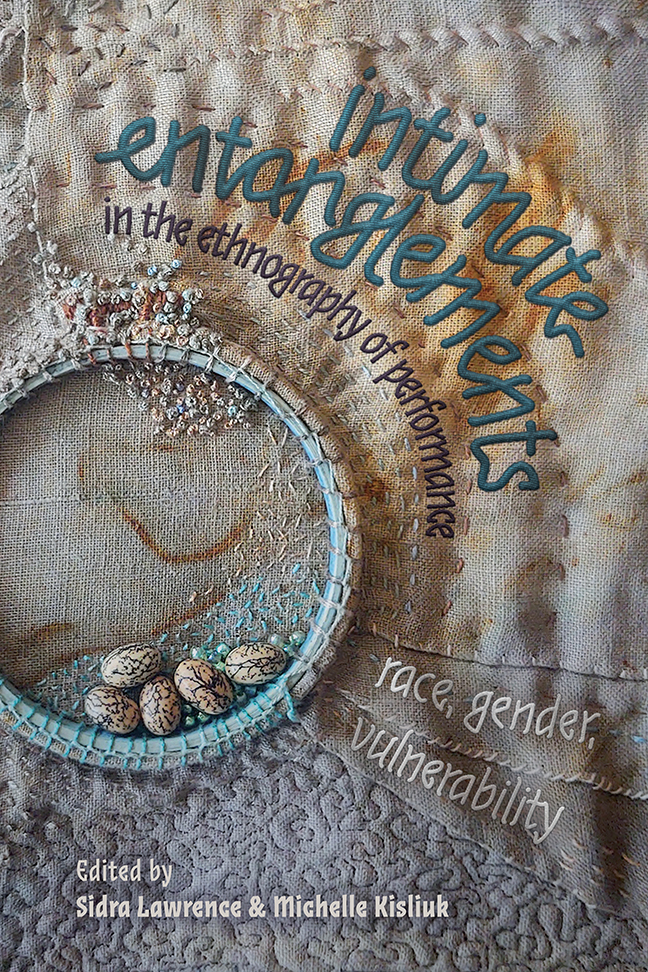Book contents
- Frontmatter
- Dedication
- Contents
- Foreword: Let It Get into You
- Acknowledgments
- Introduction: On Intimate Entanglements
- Chapter One Yusef 's Breath: Jazz Love, Cross-Racial Identification, and Paying Dues
- Chapter Two Three Reflections, with Epilogue
- Chapter Three Modulating Flawed Bodies: Intimate Acoustemologies, Chronic Pain, and Ethnographic Pianism
- Chapter Four Performing Desire: Race, Sex, and the Ethnographic Encounter
- Chapter Five Thick Descriptions
- Chapter Six Entering the Lives of Others: Entangled Intimacies, Trauma, and Performance
- Chapter Seven Ethnomusicological Empathy: Excavating a Black Graduate Student’s Heartland
- Chapter Eight Ethnomusicological Becoming: Deep Listening as Erotics in the Field
- Chapter Nine Mirror Dancing in Congo: Reflections on Fieldwork as Blanche Neige
- Chapter Ten Ethnography and its Double(s): Theorizing the Personal with Jews in Ghana
- Notes on Contributors
- Index
Chapter Ten - Ethnography and its Double(s): Theorizing the Personal with Jews in Ghana
Published online by Cambridge University Press: 09 January 2024
- Frontmatter
- Dedication
- Contents
- Foreword: Let It Get into You
- Acknowledgments
- Introduction: On Intimate Entanglements
- Chapter One Yusef 's Breath: Jazz Love, Cross-Racial Identification, and Paying Dues
- Chapter Two Three Reflections, with Epilogue
- Chapter Three Modulating Flawed Bodies: Intimate Acoustemologies, Chronic Pain, and Ethnographic Pianism
- Chapter Four Performing Desire: Race, Sex, and the Ethnographic Encounter
- Chapter Five Thick Descriptions
- Chapter Six Entering the Lives of Others: Entangled Intimacies, Trauma, and Performance
- Chapter Seven Ethnomusicological Empathy: Excavating a Black Graduate Student’s Heartland
- Chapter Eight Ethnomusicological Becoming: Deep Listening as Erotics in the Field
- Chapter Nine Mirror Dancing in Congo: Reflections on Fieldwork as Blanche Neige
- Chapter Ten Ethnography and its Double(s): Theorizing the Personal with Jews in Ghana
- Notes on Contributors
- Index
Summary
Theorizing the personal.
Summoning intersubjective awareness.
Not to mine it or use it. Not to appropriate it or reduce it. But to creatively, feelingfully, critically position what is relevantly personal and interpersonal. It might seem at first that theorizing and the personal are at odds, and that intersubjectivity is unknowable. There is a legacy—an affliction— that asserts these binaries. But once we understand how the personal infuses everything we know whether or not we show it or even recognize it, and once we allow for embodied, empirical ethnographic scholarship to also be intermodal, contrapuntal, and co-present—to become creative nonfiction, performance art, and collective creation—the false dichotomies evaporate. What is unapologetically human then exposes and expels the stifling pedant in our midst. Released, we can stride ahead baring our gaps and mistakes. Embracing our stumbles and bumbles, we can delve into vulnerable and open questions—tumbling into the unplanned lessons we most urgently need.
the conceptual setting
ethnography and its double(s)
In The Theater and Its Double (1938), the genius madman Antonin Artaud articulated a socioaesthetic vision of performance that challenged the complacent bourgeois theater of those perilous times. Here, in our own perilous times, I extend Artaud's “double” to encompass performance, ethnography, and academia more broadly. More specifically, I propose that we identify an avant-garde approach to ethnographic research and writing; some may call it radical but really it's just human. It leads to poetically grounded description/ evocation and interactive reiteration of musicking, dancing, and social and spiritual practices. This approach can be (and has been) vital for generating empathic intercultural bonds for healing across smoldering neocolonial and other divides. Ethnographic intercultural exchange, like metaphor, offers us a perceptual clearing as we expand and enter new domains. Intangible vulnerabilities that render all parties open to being changed are required. But without vulnerability we get instead a regressive mirror image—a deadening double—of what would have been a vital process.
To understand the dynamics of this double is to learn to distinguish the endeavors and enactments that dismantle oppressive forces from those that uphold oppressions.
- Type
- Chapter
- Information
- Intimate Entanglements in the Ethnography of PerformanceRace, Gender, Vulnerability, pp. 194 - 242Publisher: Boydell & BrewerPrint publication year: 2023



